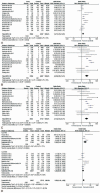Association between RAD51 135 G/C polymorphism and risk of 3 common gynecological cancers: A meta-analysis
- PMID: 29952992
- PMCID: PMC6039596
- DOI: 10.1097/MD.0000000000011251
Association between RAD51 135 G/C polymorphism and risk of 3 common gynecological cancers: A meta-analysis
Abstract
Aim: Available data concerning the association between RAD51 135G/C (rs1801320) polymorphism and the risk of 3 common gynecological cancers still could not reach a consensus. Thus, we conducted a meta-analysis to explore the relationship.
Methods: Several electronic databases and bibliographies of relevant articles were screened to identify the studies up to July 2017. Then a meta-analysis was performed to evaluate the connection between 3 common gynecological tumors' susceptibility and RAD51 135G/C polymorphism in different inheritance models. Simultaneously, we did subgroup analysis and sensitivity analysis if necessary.
Results: A total of 11 articles including 14 studies involving 4097 cases and 5890 controls were included in this meta-analysis. Overall, RAD51 135G/C polymorphism increased the risk of 3 common gynecological tumors. The subgroup analysis stratified by cancer types- endometrial carcinoma (EC) and ovarian cancer (OC)-showed that RAD51 135G/C polymorphism increased the risk of EC: allele model (C vs G: odds ratio [OR] = 4.32, 95% confidence interval [CI] = 2.63-7.10, P < .00001), dominant model (CC + GC vs GG: OR = 2.28, 95% CI = 1.44-3.60, P = .004), recessive model (CC vs GC + GG: OR = 10.27, 95% CI = 14.71-22.38, P < .00001), and homozygous model (CC vs GG: OR = 7.26, 95% CI = 3.59-14.68, P < .00001), but there was no significant association between RAD51 135G/C polymorphism and OC. In the subgroup analysis stratified by source of controls, a significantly increased risk was observed in hospital-based studies. Nevertheless, the data showed RAD51 135G/C polymorphism had no link in population-based studies.
Conclusions: This meta-analysis suggested that RAD51 135G/C polymorphism was a risk factor for the three common gynecological tumors, especially for EC among hospital-based populations.
Conflict of interest statement
The authors declare no conflicts of interest.
Figures




References
-
- Goode EL, Ulrich CM, Potter JD. Polymorphisms in DNA repair genes and associations with cancer risk. Cancer Epidemiol Biomark Prev 2002;11:1513–30. - PubMed
-
- Rollinson S, Smith AG, Allan JM, et al. RAD51 homologous recombination repair gene haplotypes and risk of acute myeloid leukaemia. Leuk Res 2007;31:169–74. - PubMed
-
- Nogueira A, Catarino R, Coelho A, et al. Influence of DNA repair RAD51 gene variants in overall survival of non-small cell lung cancer patients treated with first line chemotherapy. Cancer Chemother Pharmacol 2010;66:501–6. - PubMed
Publication types
MeSH terms
Substances
LinkOut - more resources
Full Text Sources
Other Literature Sources
Research Materials
Miscellaneous

